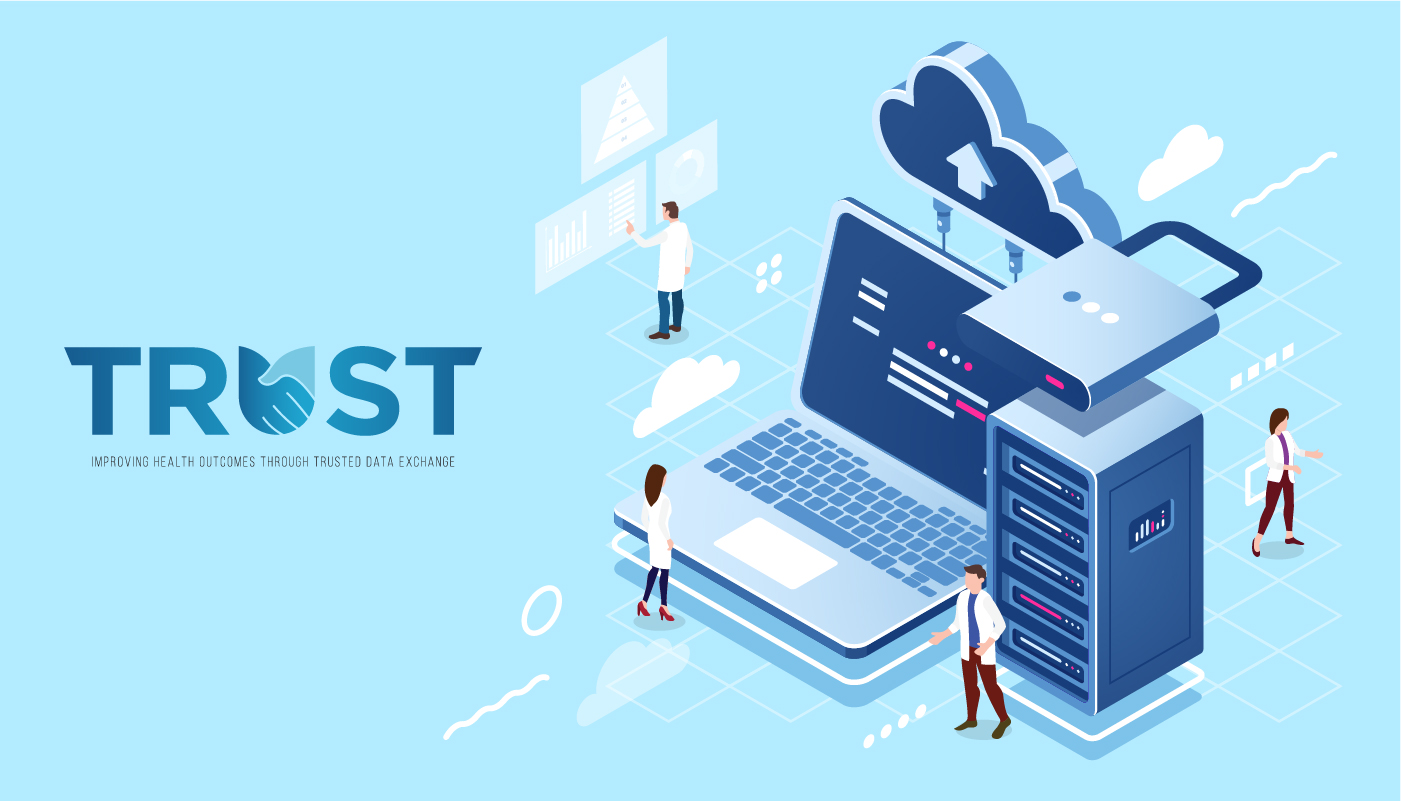Driving Better Health Outcomes: TRUSTed Data Ecosystem

Mention precision medicine and what probably comes to mind are cutting-edge technologies such as genome sequencing and pharmacogenomics. But without safe and expedient access to good data, these technologies remain promises.
“Data is key to unlocking the full potential of precision medicine,” says Ms. Koh Mingshi, Director, Chief Health Scientist Office, Ministry of Health. “To provide valuable insights from precision medicine, we need to be able to bring together and analyse different types of data safely and in a manner that engenders trust.”
However, there are prevailing challenges in accessing the broad spectrum of health, research and social-related data sets. “Based on feedback from researchers, it is not unusual for researchers to write to many different organisations and approving authorities to get data access,” says Mingshi. “In some cases, by the time data approvals are obtained and they get the data they need, their research grant funding period could be over. There is also a lack of a central trusted third party and secure platform to help bring different types of data together. At the same time, varying data standards in the field make it challenging to analyse multiple data sources efficiently to generate deep insights.”
TRUST in a common platform
TRUST aims to address these challenges—for both precision medicine and healthcare research. Short for “Trusted Research and Real world-data Utilisation and Sharing Tech”, TRUST is jointly developed by the Smart Nation and Digital Government Office (SNDGO), Government Technology Agency (GovTech), Integrated Health Information Systems (IHiS) and the Ministry of Health (MOH).
Operationalised in November 2022, TRUST is currently in the second of its three-phase roadmap. “Taking a phased approach enables us to be nimbler and more flexible in responding to user needs and technology developments,” Mingshi shares. “And thanks to strong partnerships with the larger community, we have accomplished much in our first phase.”
Under its first phase, TRUST has adopted the Five Safes Framework (an internationally recognised framework covering data use and access); developed the pilot phase data sharing platform, anonymisation and fusion tools to enable linkages and safe sharing; established the TRUST Data Access Committee (DAC) to oversee and approve all data requests; determined permissibility and governance of TRUST datasets; finalised national level pre-agreements terms for data requestors and contributors which spells out how data will be shared and used; as well as completed proof-of-concept use cases involving datasets across research institutions and real world data.
Mingshi adds, “TRUST continues to evolve in the second phase—with a focus on enhancing user experience. As we give greater priority to users from Singapore’s public research organisations in the current phase, we realised there is a wide spectrum of users—ranging from data scientists to those who are less familiar with coding, programming and/or machine learning. This is why we are progressively introducing new tools and solutions to enable TRUST to cater to a broader user group. This will prepare TRUST for the third phase, where we open up to other users.”
TRUST in precision medicine
Foreseeably, as Singapore embarks on the National Precision Medicine (NPM) programme, TRUST will play an important role in supporting the endeavour. Mingshi explains, “Precision medicine is essentially about being able to provide more precise health and healthcare insights and interventions for individuals or a targeted segment of the population. This will require a system of bringing together and analysing different types of health-related data (clinical, genomic, phenotypic, social, environmental) safely and expeditiously.
“That is where TRUST comes in. It brings together health-related research and real-world data across different organisations and institutions to enable anonymised data sharing and analytics. This helps to realise the full potential of large-scale population cohort studies like SG100K. Furthermore, researchers can now interface with just one party—TRUST—to access interoperable datasets. The time saved from going to numerous data owners can instead be channelled to generating new or deeper insights.”
TRUST in advancing research
Beyond smoothening the data access process for researchers, TRUST aims to create an ecosystem where data contributors and requestors stand to benefit. Data contributors will enjoy priority access to link their research data with other TRUST data, and also benefit from support by TRUST’s data cleaning team to organise their data in a format interoperable with international standards.
At the same time, data contributors retain the right to comment on requests for their data that come through TRUST, opening up new opportunities for research collaboration with other parties. On the other hand, requestors enjoy a more seamless process for accessing a wide range of health-related research and real-world data. Mingshi says, “TRUST therefore serves as a collaboration network for data contributors and requestors alike. And in the long run, this adds to the pool of available data for researchers to power their research.”
TRUST in the future
TRUST aims to be a valuable resource for the research community—in Singapore and globally. As the team focuses efforts on bringing different types of data onboard TRUST and expanding the types of use cases TRUST can support, improvements such as privacy preserving technologies continue to be tested and incorporated.
Mingshi says, “Our conversation and engagement with the research community will be an active and iterative one to ensure that the platform continues to address needs of the community. And through facilitating the researchers’ work, we hope to generate value and bring better health outcomes for society.”

